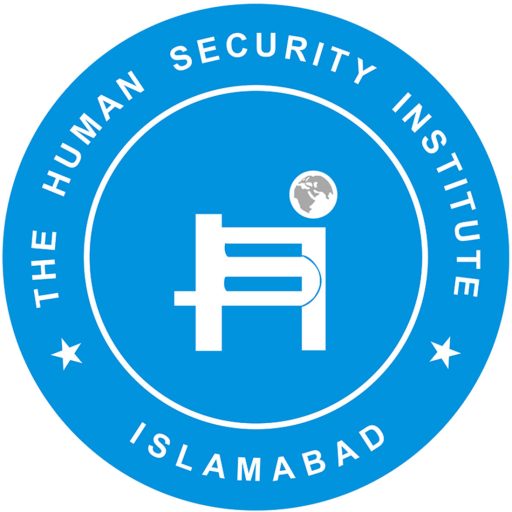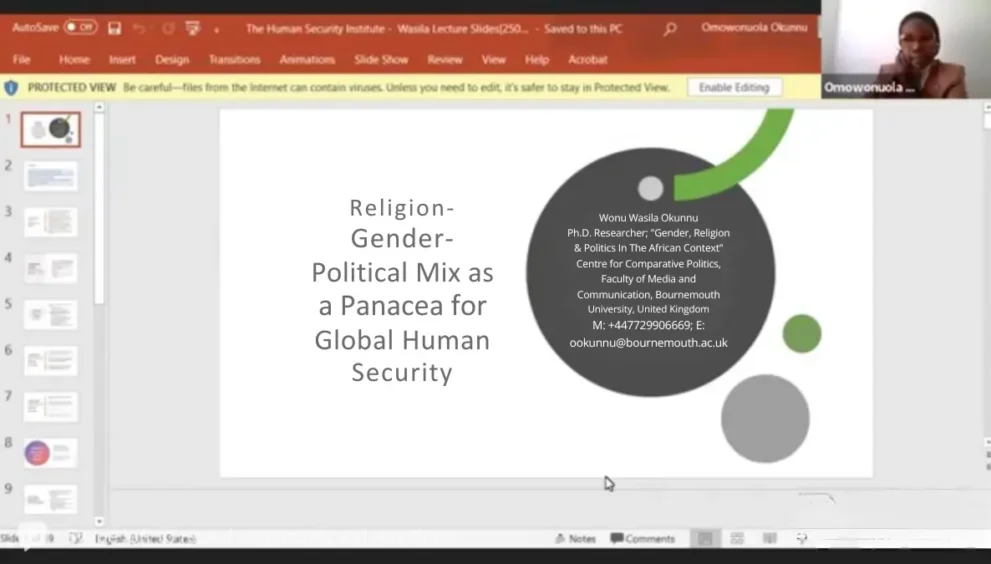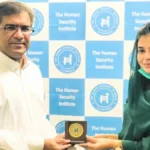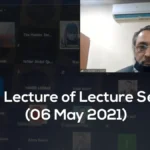The Human Security Institute
Minutes of 4th Lecture of Lecture Series on Religion-Gender-Political Mix as a Panacea for Global Human Security
Guest Speaker: Ms. Omowonuola Wasila Okunnu
Date: April 29, 2021
Time: 01:00 pm
Introduction: Human insecurity in a glimpse:
- Since the first decade of the 21st Century, the world has become a dangerous place.
- Humanitarian efforts and human rights laws are largely ignored and systematically violated.
- Social inequality has increased dramatically.
- Consequent increasing competition for scarce resources contributes to unstable political structures.
- there is human insecurity generated by neo-liberal globalization.
- There is a growing insecurity of indigenous peoples.
- There is also human insecurity generated by militarization.
- Last but not the least, there is also issue of gender insecurity.
Historical Overview of Human security:
The UNDP Human Development Report of 1993:
- the individual must be placed at the center of international affairs.
- the concept of security must change.
- from an exclusive stress on national security to a much greater stress on people’s security.
- from security through armaments
- to security through human development
Ultimately human security emphasizes that the security agenda and the development agenda are merely different sides of the same coin.
Prevention of violence is promotion of human security – there is a need to constantly emphasize human values and the ethical dimension of economic, social and political life.
Human security is response to approach of ensuring human freedom and human fulfilment through the vital core of all human lives.
All individuals, in particular vulnerable people, are entitled to freedom from fear and freedom from want. It means protecting people from critical (severe) and pervasive (widespread) threats and situations.
Religion as a panacea for Human Security:
- This world is filled of worries and frustration,
- It is the only institution which control frustration duo social, economic, and political problems.
- Failure in some goals provide frustration in life and religion is responsible for their control.
- This world is filled of worries and frustration.
- It is the only institution which control frustration duo social, economic, and political problems.
- Failure in some goals provide frustration in life and religion are responsible for their control.
- It promotes equality in human beings.
- There is no high and low is the eyes of religion, and everyone is equal to other.
- Islam says that there is no preference of Arab over non-Arab and non-Arab over Arab.
- So, Religion develop equality.
Gender as a panacea for Human Security:
- Gender refers to the socially determined differences between women and men; these are learned, changeable over time and have wide variations both within and between cultures.
- Gender is related to how we are perceived and expected to think and act as women and men.
Gender is a complex concept and is shaped by:
- Social
- Cultural
- Economic and
- Political contexts in each country.
Gender differences can also vary depending on:
- Race
- Ethnicity
- Religion
- Age and
- Marital status
Global politics as a panacea for Human Security:
Global politics is:
the study of political and economic patterns of the world
the study of political globalization in relation to questions of social power.
Global politics studied the relationships between
- cities
- nation-states
- multinational corporations
- non-governmental organizations and
- international organizations (Jan-Erik Lane)
Today, the practices of global politics are defined by values:
- norms of human rights
- ideas of human development, and
- beliefs such as Internationalism or cosmopolitanism about how we should relate to each.
Religion, Gender, and Global Politics as a panacea for Human Security:
- Gender, religion, and politics require examination of:
- How nation states as well as international and global governance structures deal with gender equality issues that are highly contested.
- How national, international, and global government institutions relate to religious stakeholders and actors (e.g., the Catholic Church)
- How faith-based and secular voluntary organizations mobilize in relation to gender equality issues.
- How religious communities deal with gender equality and women’s rights issues; and
- How religious women and men perform and negotiate gender relations in their everyday lives.



